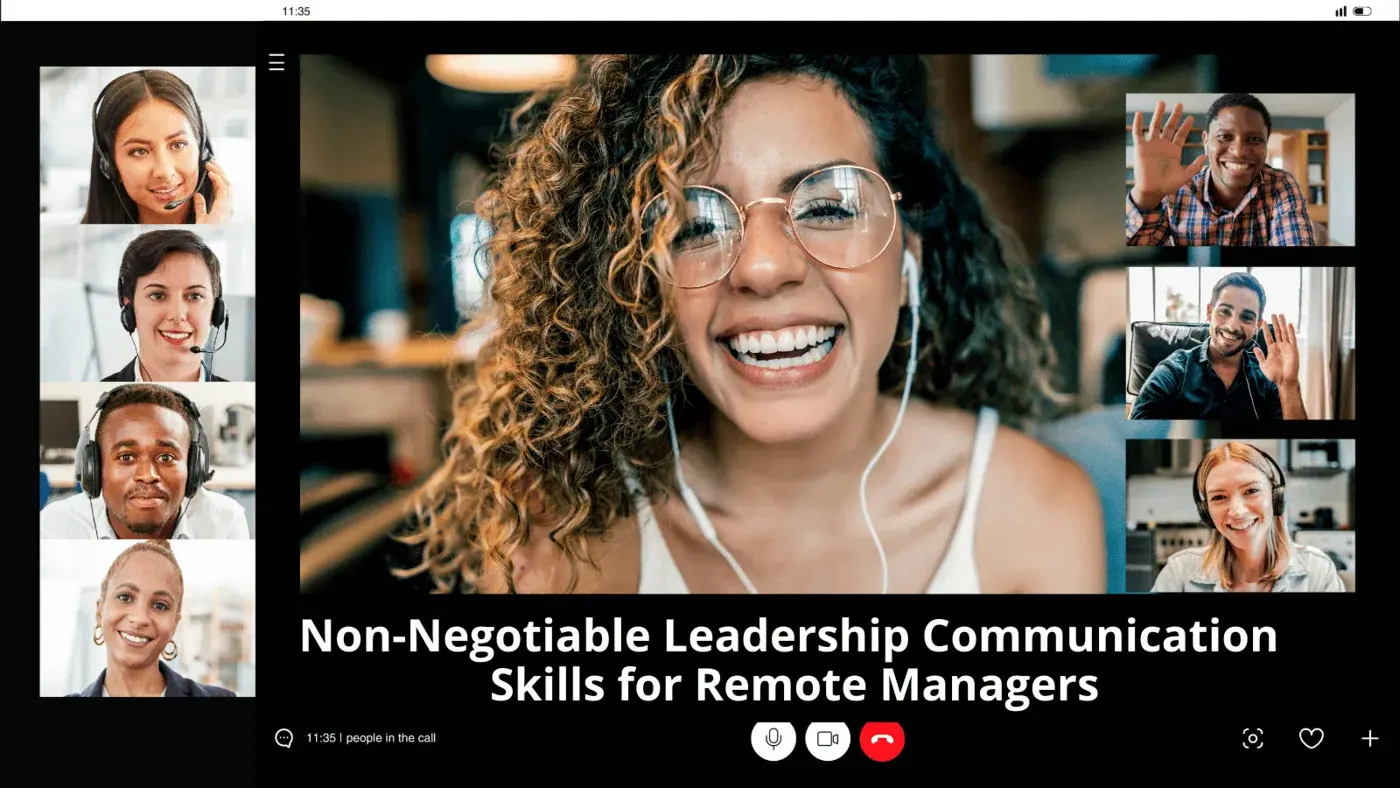7 Leadership Communication Skills for Managing a Remote Team
By Gaurav Sharma, founder and CEO of Attrock, a results-driven digital marketing company he grew an agency from 5-figure to 7-figure revenue in just...

By Gaurav Sharma, founder and CEO of Attrock, a results-driven digital marketing company that he grew an agency from 5-figure to 7-figure revenue in just two years. He also contributes to top publications like HuffPost, Adweek, Radical Candor, Business 2 Community, TechCrunch, and more.
Effective management is the bedrock of any successful organization. It influences nearly every aspect of a business, from decision-making to conflict resolution and resource management.
That’s why it’s no surprise that for the second year in a row, Gartner reports “Leader and Manager Development” as the number one priority for HR leaders. The survey further states that 76% of managers admit to getting overwhelmed by their responsibilities.

Despite manager effectiveness being vital, many companies fail to recognize that management is a job with specific skills that need to be learned. In many companies, managers receive little-to-no training, and this has very real consequences.
A 2018 study by digital services firm West Monroe Partners found that 41% of small-team managers received no training before becoming managers and 42% mimicked the style of a previous manager in lieu of any training or coaching.
And if they’re mimicking bad-boss behavior because they don’t have any other models, that’s going to be a problem for the entire team.
Here's what you need to know about effective management so you can set everyone up to succeed.
Need management training Let's talk!

Manager effectiveness refers to various sets of skills and abilities that help managers guide teams to achieve results.
It encompasses aspects such as:
As leaders, managers set the tone in an organization. Effective management can pave the way for a healthy work environment, where everyone knows that their efforts are appreciated and their voices are heard. On the other hand, ineffective management can cost companies time, talent, and a lot of money.

You’ve likely heard the phrase, “people don’t leave companies, they leave managers.”
This is true. In a 2022 study by Harvard Business Review, it was discovered that the least effective managers had three to four times as many employees quitting their jobs compared to leaders who are considered the most effective.
These employees often felt undervalued and unappreciated and some believed that their managers were biased.This is why business leaders should know about various tactics to improve a manager’s effectiveness.
Here are some reasons manager effectiveness matters:

Effective management goes beyond achieving business goals. It's about building relationships and creating the kind of work environment where people feel seen, heard, safe, and supported to do their best work.
At many organizations the only opportunity for growth, advancement, and a pay bump is to become a manager — but not everyone can be an effective manager.
For folks who thrive on building a team and guiding others to achieve results, becoming a manager may be a dream come true.
On the other hand, management could be a nightmare for high-performing individual contributors who are experts in their fields but have a low frustration tolerance for herding cats.
Before accepting a management job, ask yourself whether you want to do the things managers do like coaching, soliciting and giving feedback, and building teams to get stuff done, or do you want to be a manager for power, money, or control?
If your motivation for becoming a manager is entirely monetary, you’re going to be miserable, and you certainly won't be effective.
Before promoting someone else to management, remember that just because someone is a stand-out individual contributor doesn't mean they'll be an effective manager. Assess folks based:
Once you have a manager, you have to train them to be effective. Below are some of the best tactics to improve a manager’s effectiveness.
Managers need to be aware of what’s expected of them and their team, so they’ll be able to organize their time and resources better.
As an HR leader or executive, leave no room for assumption. Ensure that your managers have a clear understanding of their roles and responsibilities.
This could mean setting clear goals and having targeted discussions with them to help them adjust their strategies accordingly.
You can even consider implementing the SMART goal technique, which answers the following objectives:
You can also use a bottoms-up OKR (objectives and key results) process to ensure your entire team is on the same page about the goals and objectives. This shared understanding is critical for effective execution.

Great communication is one of the top tactics to improve a manager’s effectiveness. When managers can’t communicate their expectations and instructions to employees clearly, the entire team is affected. Poor communication can also leave room for misunderstandings and frustrations.
That’s why it’s essential to make effective communication with managers a top priority. One of the best ways to improve leadership communication is by providing workplace communication training, since communication skills vary.
Managers will learn tips on how to deliver feedback and relay information. For example, when delivering messages, aim for clarity and brevity. Stay away from jargon and complex language. Instead, use straightforward, easily understandable terms.
Also, remember to encourage managers to establish various channels of communication that employees can use to approach them. Not all employees have the same personalities; some prefer one-on-one talks, while others would rather send emails.
Some of the communication channels managers can consider include team briefings, phone calls, short video recordings, and instant chat messaging.
For more effective communication, managers should be trained to:
With many managers working from home today, you can leverage team communication tools like Slack, Loom, Zoom, and more.
These platforms can help maintain constant communication with all managers in the organization and ensure they’re all on the same page.
While doing so, ensure that each manager feels heard. This could mean being open to receiving their feedback while also offering yours in a constructive manner that will keep everyone in the winning spectrum.

Reaching milestones deserves a celebration. While you don’t need to throw a party, you can and should acknowledge managers who do a great job at achieving goals within their team.
Recognizing their contributions is an essential part of keeping them engaged. It also shows that you respect and appreciate their efforts, which, in turn, improves morale and increases engagement.
Here are some of the strategies to implement to recognize managers’ wins:
Being a true collaborator means constantly working with managers to come up with new ideas on how to improve operations. This can be as simple as suggesting more efficient workflows, proposing new tools or technologies, or having managers from different departments come together and brainstorm ideas.
Doing so will encourage them to work together, learn from one another, and understand different aspects of the organization.
Here are more ways to improve collaboration:
Great organizations also promote a culture of mentorship. They not only offer guidance and support to their managers but also advocate for peer-to-peer mentorship.
Mentorships are important because they enable managers to learn from one another’s experiences, gain new perspectives, and develop their skills faster.
You can encourage mentorship by providing opportunities for managers to network and build relationships beyond the office. This could be through facilitating networking events or workshops.
You can even encourage them to build personal brands on LinkedIn by endorsing their skills, providing recommendations, and sharing their achievements on the platform. This will help expand their professional network.
Other ways to establish an effective mentorship program for managers include:
Offering continuous learning and development for managers is one of the top tactics for enhancing their effectiveness.
By investing in their professional development, you ensure that they’re equipped with the latest skills and knowledge they need to perform. This, in turn, will lead to increased productivity, innovation, and job satisfaction.
There are multiple ways to invest in your managers’ professional development, including:
From better communication and relationships, to increased agility and performance, companies that invest in implementing Radical Candor are likely to see meaningful improvements in how their teams work together and the results they achieve.
High-performing organizations understand the big role that effective managers play to ensure they stay afloat. That’s why they follow the best tactics to improve a manager’s effectiveness.
Even if you already have effective managers, you should still leverage these tactics to maintain their performance. Ultimately, these strategies will help you build a stronger, more united organization.
Ready to get started? Book a call with Radical Candor today!

Gaurav Sharma is the founder and CEO of Attrock, a results-driven digital marketing company. He grew an agency from 5-figure to 7-figure revenue in just two years | 10X leads | 2.8X conversions | 300K organic monthly traffic. He also contributes to top publications like HuffPost, Adweek, Radical Candor, Business 2 Community, TechCrunch, and more.
Do you want to fix communication issues in the workplace? Then you need The Feedback Loop (think Groundhog Day meets The Office), a 5-episode workplace comedy series starring David Alan Grier that brings to life Radical Candor’s simple framework for navigating candid conversations.
We’re offering Radical Candor readers 10% off the self-paced e-course. Follow this link and enter the promo code FEEDBACK at checkout.

By Gaurav Sharma, founder and CEO of Attrock, a results-driven digital marketing company he grew an agency from 5-figure to 7-figure revenue in just...

A Gallup research study notes that 59% of employees in remote-capable positions want a hybrid work setup. And 60 percent of exclusively remote...

By Jodie Hurst, a financial analyst turned entrepreneur who advises businesses on using technology to manage teams, upskill staff, and streamline...